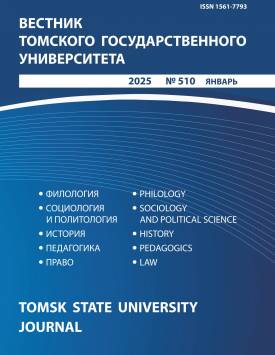On the "lack of alternative" to alternative sanctions applied to minors
The article examines the system of methods of criminal legal influence on persons who committed criminal acts at a minor age. The statistical data of the Judicial Department at the Supreme Court of the Russian Federation on bringing minors to criminal responsibility for the period 2020-2023 are presented; the practice of imposing punishments and other measures of a criminal legal nature alternative to imprisonment is analyzed. The authors draw attention to the significant imbalance in the current system of measures of criminal legal influence on minors, in which real and conditional imprisonment prevail. In order to identify the causes of this imbalance, the practice of applying alternative punishments to minors (fines, compulsory labor, correctional labor, and restrictions on freedom) is analyzed. Based on the analysis, the authors state that, despite the presence in the Criminal Code of the Russian Federation of six types of punishments that can be imposed on minors, only two of them are actually applied - compulsory labor and imprisonment. At the same time, deprivation of liberty, which is recommended by international legal standards to be applied only in extreme cases, is imposed on minors more often than all other types of punishments. At the same time, the niche of punishments that have not been widely used has been firmly occupied for many years by probation, whose popularity the authors attribute not to its effectiveness, but rather to its universality. Thus, the analysis of the provisions of Articles 73 and 88 of the Criminal Code of the Russian Federation leads the authors to the conclusion that when sentencing a minor, the court is practically not limited in assigning a suspended sentence. The limited use of compulsory educational measures by courts is also noted, due, on the one hand, to the complexity of their legal nature, and, on the other hand, to shortcomings in the legal regulation of the procedure for their appointment and execution. Summing up the research, the authors conclude that a legally defined system of punishments and alternative measures to imprisonment that can be applied to minors is practically no alternative in practice. It is proposed to make a number of changes to criminal legislation: to limit the appointment of a suspended sentence, to recommend to the courts to expand the practice of imposing punishment on minors in the form of restriction of freedom, as well as to regulate the procedure for the appointment and execution of compulsory educational measures. The authors declare no conflicts of interests.
Keywords
alternatives to imprisonment, punishment, criminal law measures, minors, compulsory educational measuresAuthors
| Name | Organization | |
| Golovastova Yulia A. | Academy of the Federal Penitentiary Service of Russian Federation; Moscow Witte University | ugolovastova@yandex.ru |
| Skorokhodova Alexandra S. | Saint Petersburg University of the Federal Penitentiary Service of Russia; Academy of the Federal Penitentiary Service of Russian Federation | Skorokhodova@yandex.ru |
References

On the "lack of alternative" to alternative sanctions applied to minors | Vestnik Tomskogo gosudarstvennogo universiteta – Tomsk State University Journal. 2025. № 510. DOI: 10.17223/15617793/510/22
